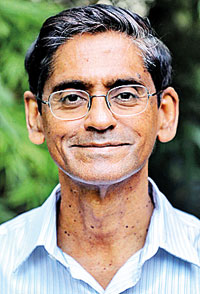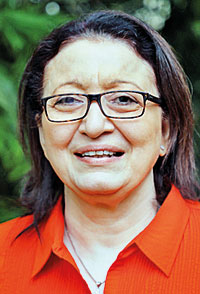World premiere of Lalanath’s cello concerto at SOSL concert
View(s):By Shannon Salgadoe
Tuning their instruments in anticipation of the first concert in this year’s musical calendar, the Symphony Orchestra of Sri Lanka (SOSL) will take the stage of the Lionel Wendt Theatre on Saturday, March 23, in the Nations Trust Bank SOSL Concert 2024, a classical evening of musical splendour.
Featuring music by composers Franz von Suppé and Johannes Brahms, the concert will also see the world premiere of a cello concerto composed by Lalanath de Silva, formerly a resident conductor for the SOSL. Lalanath’s previous compositions include several oratorios, overtures, a requiem, and a concerto for sitar.

Lalanath de Silva
A regular guest conductor for the SOSL in the recent past, Japan’s Keiko Kobayashi returns to Sri Lanka to conduct the orchestra. Widely acclaimed, having conducted many leading orchestras in Japan, China, and Italy, Keiko is the chief conductor of the Japan Wind Ensemble and resident conductor of the Tokyo Wind Symphony Orchestra.
Franz von Suppe’s Light Cavalry Overture is from his eponymous 1866 operetta which debuted in Vienna. Although the operetta itself may not be well known, the overture is one of Suppe’s more popular compositions. In military terminology, light cavalry refers to troops who are trained to fight while riding their horses, and this overture brings to life the chaotic imagery of these troops in battle with its energetic and lively orchestration.
The orchestra will also be performing Symphony No. 1 in C minor by German composer Johannes Brahms, who completed this, his first symphony, almost two decades after he first began working on it. Having composed several chamber pieces and works for piano, Brahms’ musical prowess led to the musical world placing high expectations on him to write grand symphonies, but the fear of failing to match up to the ideals of Beethoven kept him from completing his symphony in a more timely fashion with Brahms famously declaring, “I shall never write a symphony! You can’t have any idea what it’s like to hear such a giant marching behind you.”

Dushyanthi Perera
In a coincidental parallel, the highlight of the evening, the cello concerto composed by Lalanath also took just under two decades to complete, with its first movement being completed and set aside until inspiration struck a little more than ten years later. Slightly atypical in structure as most concertos are made up of three movements, this concerto comprises four with the first movement being darker in mood as it reflects a trying time in Lalanath’s life, contrasting largely with the remaining three movements written much later. The third movement is a set of variations on the Thuranga (horse) Vannama, while the final one is a Baila, which will undoubtedly be familiar to all who hear it.
“There’s a rich history here, and what I’m trying to do is take it out of the popular sphere and bring it to the concert stage,” says Lalanath. The concerto as a whole features a few percussion instruments such as a bongo and tabla with a host of percussion joining in the fourth movement.
Although it is a concerto composed for the cello, both the soloist and orchestra are presented with a challenge. “It is a bit wrong to say that the orchestra is accompanying the cellist. It’s actually a collaborative venture and there are a lot of things that are going back and forth between solo instruments and the orchestra. It’s really a dialogue,” he explains.
Having written smaller pieces for cello here and there, the inspiration for Lalanath’s first cello concerto can be attributed to hearing the instrument regularly in his environment, played by his daughter. He also considers the cello to be one of the most expressive among the string instruments, having a wide range and the ability to capture deep and soulful expressions while simultaneously being quite agile. “When writing a concerto, firstly, you’re looking for an instrument that you can write without too many constraints. The cello, perhaps also the violin – these instruments that present themselves. The second, of course, is the fact that you’re really trying to find performers who can actually give life to your creativity and Dushyanthi certainly is the leading exponent of the cello in our country.”
Dushyanthi Perera, one of
Sri Lanka’s leading cellists and resident conductor of the SOSL is the soloist for the evening. Having joined the orchestra at the remarkable age of nine, Dushyanthi became the principal cellist for the orchestra for many years before laying down her cello to take up the baton. “I got on the podium 12 years ago and since then, I have not had the opportunity to perform because I have had to conduct. This is the first time in a long time that I’m getting that opportunity to perform with the orchestra and I’m very happy to be able to play the cello again,” she says.
The Nations Trust Bank SOSL Concert 2024 will take place on March 23 at the Lionel Wendt Theatre. Tickets priced at
Rs. 7500, Rs. 5000, Rs. 4000,
Rs. 3000 and Rs. 1500 (balcony)
are available at the Wendt.
Searching for an ideal partner? Find your soul mate on Hitad.lk, Sri Lanka's favourite marriage proposals page. With Hitad.lk matrimonial advertisements you have access to thousands of ads from potential suitors who are looking for someone just like you.


